The recent lawsuit filed by the SEC against major cryptocurrency exchanges Binance and Coinbase continues to be a significant topic of discussion. The SEC has alleged that certain altcoins mentioned in the lawsuits should be classified as securities rather than simply cryptocurrencies. Notably, altcoins such as Cardano (ADA), Solana (SOL), Filecoin (FIL), and Polygon (MATIC) were specifically mentioned in the SEC’s legal filings.
Following the SEC’s lawsuits, Robinhood, a popular stock exchange platform, made an announcement stating that it would no longer support trading for ADA, SOL, and MATIC. Subsequently, another cryptocurrency platform called Bakkt also revealed its decision to delist these same altcoins from its platform.
Bakkt Delists Major Altcoins Amid Regulatory Uncertainty
In a recent report by Fortune, it has been revealed that Bakkt, a cryptocurrency platform based in New York, has made the decision to delist three of the largest cryptocurrencies by market capitalization. Specifically, Solana, Cardano, and Polygon have been removed from Bakkt’s list of supported cryptocurrencies.
Chinese journalist Wu Blockchain said in a twitter post that Bakkt has recently chosen to delist ADA, MATIC, and SOL due to concerns regarding the lack of clear supervision. This decision follows Bakkt’s voluntary delisting of Algorand and Decentraland tokens during the SEC’s lawsuit against Bittrex. In May, Bakkt further delisted 25 tokens. As of now, Bakkt provides services for a total of eight tokens, including BTC, ETH, LTC, SHIB, Dogecoin, and USDC, following these latest delistings.
The company’s general counsel and secretary Marc D’Annunzio told Fortune it was taking action “until there is further clarity on how to compliantly offer a more extensive list of coins.”
SEC Lawsuit and Impact on Industry
The regulatory actions taken by the SEC have prompted various crypto platforms to reevaluate their token listings. Last week, popular fintech app Robinhood announced its decision to cease support for Solana, Polygon, and Cardano by June 27, citing the ongoing regulatory crackdown. Similarly, social trading platform eToro revealed that it would delist Polygon, Decentraland, Dash, and Algorand from its U.S. platform starting July 12.
Bakkt had previously delisted Algorand and Decentraland in April, following the SEC’s lawsuit against Bittrex. Nevertheless, Bakkt continues to offer support for eight other cryptocurrencies, including Bitcoin, Ether, Dogecoin, Litecoin, USDC, and Shiba Inu.
The SEC’s regulatory actions have triggered a wave of reconsideration within the industry, with crypto platforms taking steps to comply with regulatory requirements and make adjustments to their token offerings. This ongoing situation underscores the impact of regulatory scrutiny on the crypto market as platforms navigate the evolving regulatory landscape.
 coinpedia.org
coinpedia.org
